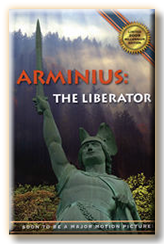

Arminius the Liberator
Screenplay under Option
While Ernst was still languishing in Mannheim Prison, sentenced to five years for having spoken Truth to Power, he and Ingrid were seriously hampered in their communications. Phone calls were very rarely allowed. Letters between them were savagely censored - and often held back for weeks at the time. She was desperately struggling to keep their information outreach going while trying to convey to him that there was hope at the end of the tunnel - that their supporters had not abandoned them.
At the same time, she was brooding day and night about how to simplify the message to the world, especially to the European peoples, that censorship was not a new phenomenon - it had its roots in centuries if not millennia of despotic oppression. She needed an allegorical message that would summarize the essence of the New World Order - that what is happening today while whole countries are being enslaved has happened many times ago in distant pasts. It was still a struggle of good versus evil - the players changed, but the struggle to breathe freely and live as you please was still as fierce as ever. She dreamed more and more of a political movie as a bridge.
As a child in post World War II, she had lived in the vicinity of the Externsteine - an ancient Germanic cult area where a gigantic battle between an imperial power and simple tribes yearning to be free had taken place. She learned about that saga in school where she sat, hungry and freezing, and dreamed about a hero whose monument had been erected on a mountain top in memory of "Hermann der Cherusker", re-christened by the Romans as "Arminius" two thousand years ago - a hero of the people who had sent the Romans packing.
Ingrid is a novelist who always thinks of plot and storyline. The anniversary of the Battle in the Teutoburger Forest was coming up, and she thought it would give Ernst sustenance to know that the struggle by oppressed people against a vicious enemy was still carried on by her and their supporters.
Ingrid knew that a feature film would be a powerful medium to bring the message home to the latter-day Germanic "tribes." She wrote two fund-raising letters and managed to collect enough funds to retain a movie producer, who lived nearby, for one year. The idea was to see if such a project could be launched in that time frame.
Unfortunately, half-way through that year - 2008 - it became glaringly evident to her that she and her producer had widely divergent conceptions of what such a movie should contain. He wanted a Rambo type action film that "would entertain and make a lot of money" - and she wanted a powerful political message of intellectual substance and artistic finesse. She realized that this producer was not the right person for what she had in mind. The project, as he conceptualized it, lacked vision and sophistication. They parted on unfriendly terms.
Meanwhile, due to a personal emergency - her oldest son was dying of renal failure - Ingrid had to postpone this project for several years. But she never forgot what she set out to do, and she has recently resolved to pick up where was forced to leave off.
She is determined to finish this project.